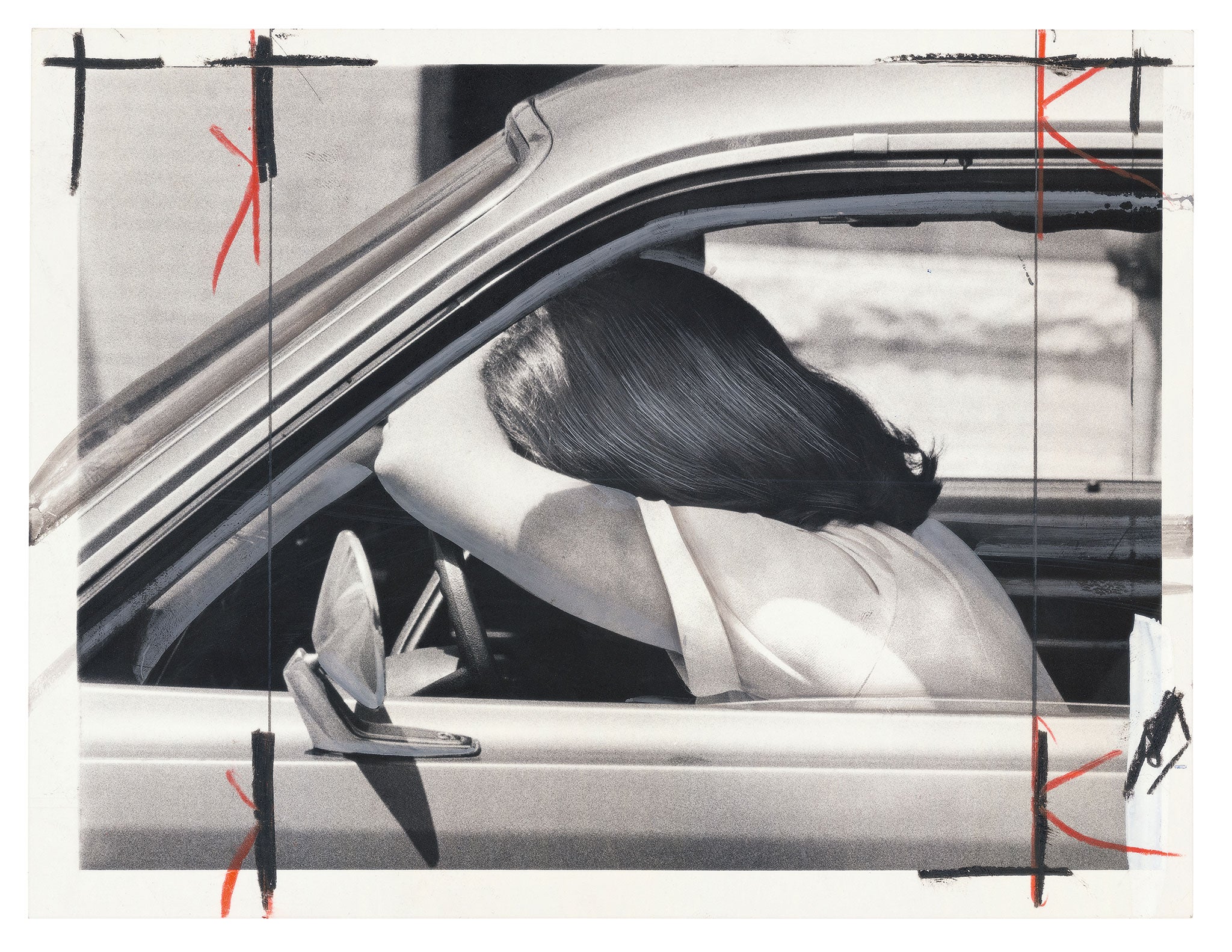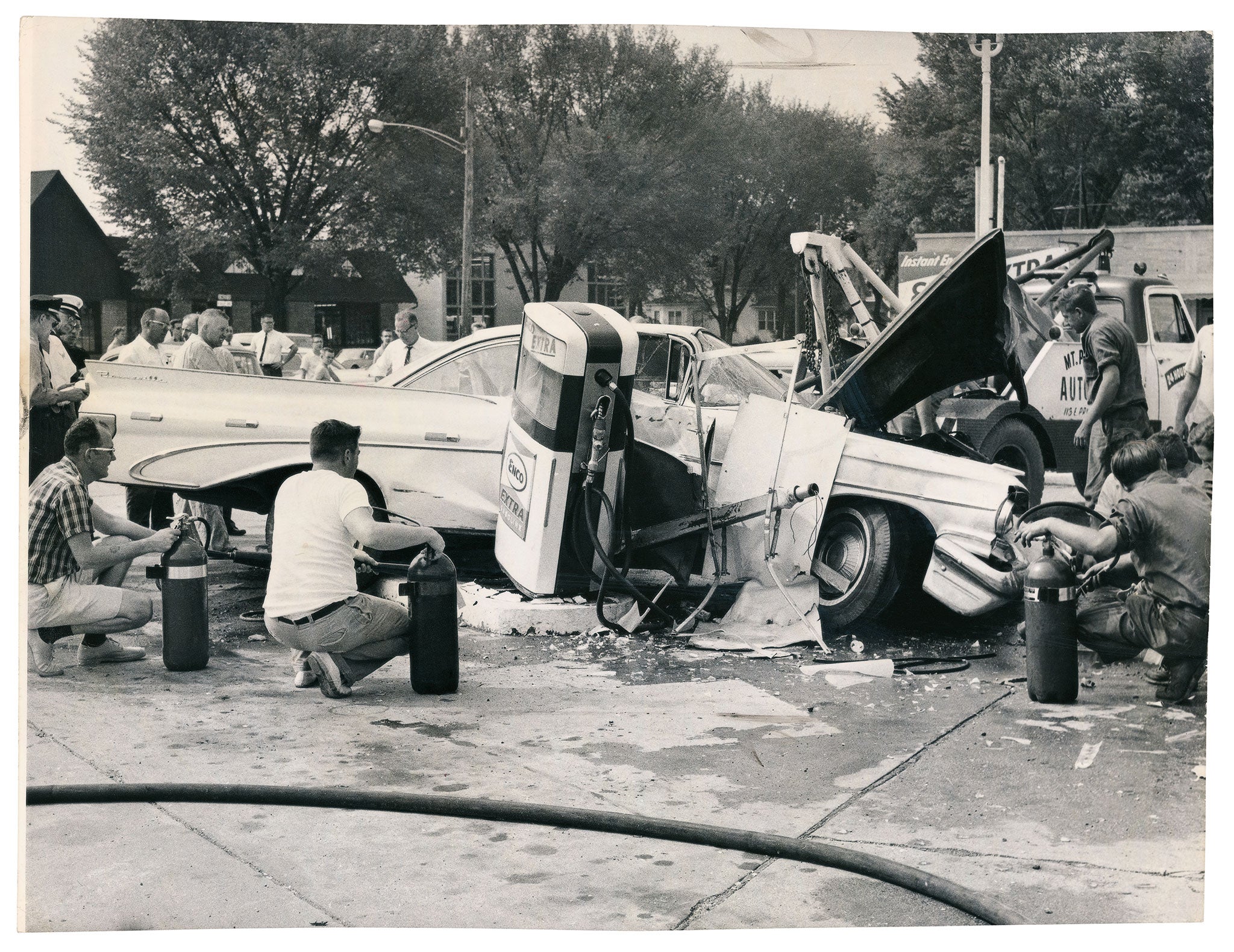Pump action: Why images of gas stations capture all things American
The gas station is one of America's most evocative symbols. Holly Williams looks back on 50 years of life at the pump
A chance encounter with a photograph of a woman, slumped over a steering wheel in apparent despair, was the spark that ignited a project collecting images of American gas stations. David Campany – artist, writer and Reader in Photography at the University of Westminster – found the snap in a second-hand shop: "I was struck by it, it had been hand retouched, taken care of. It's a really beautiful, enigmatic shot – I thought, there's a whole story in there".
The woman, it turns out, is waiting in line for the pumps in Baltimore during an oil shortage. But the photo is also enigmatic in that it's marked with red lines. These reveal its function – this isn't an art print, but a press photo, used in a newspaper story about gas shortages, then placed in an archive. Those markings indicate how it should be cropped.
These marks are part of this photo's appeal – and of the hundred or so more that Campany collected, and has now edited into a book of 35 images simply entitled, Gasoline. "They have an aesthetic of their own, those marks, although they are totally practical," he says, pointing out that many of the photographs – which span 50 years, 1945 to 1995 – have multiple markings from being used to illustrate multiple stories.
With cuttings, dates, or photographers' names scrawled on the back, these 10x8 inch glossy prints are richly imbued with their own history. They not only show, as images, a bygone world, but are themselves tangible artefacts of another disappearing world – analogue photography. "Each photo is an archive of its own use," says Campany. "That's lost in a digital archive – we have no idea how photos are used." Many newspapers have now dumped photograph archives in favour of digital records, Campany explains, meaning there are lots of these images "floating around". He largely found and bought them online.

And once he started looking, he realised gasoline stations might just be "the perfect subject". The images tell a specific story of whatever dramatic, newsworthy event was unfolding: oil shortages, a tornado, a car crash, flooding. But they also take on the qualities of their historical moment: they tell us about America's relationship with the car, with travel, with consumption, with the rest of the world. Of course, in the current climate, where we're reconsidering our dependence on oil, these images also seem to both eulogise and criticise the era when the car was king.
Finally: they just look good. The gas station is elevated to icon in the visual language of 'America'; we recognise it, instantly. "They are very visually striking things, gas stations, and they are great markers of what's going on in an oil-based society," elaborates Campany. "As well as having that really strong iconography, if you could latch on to the gas station, it would tell you a story about society. It ends up being an allegory: that 50 years [is] a golden period of motoring – we don't have that attitude any more. As well as news photos being a dying thing, that feeling about motoring is also dying."

He's not the first to collect such images: American artist Ed Ruscha famously produced the book Twentysix Gasoline Stations in 1963. Unlike Campany's "crisis" shots, taken for their news hooks, Ruscha's photos are still, eerily empty. Was this something he wanted to riff against, positioning active shots in contrast to Ruscha's almost abstract ones? "Very much so. Nothing happens in that world, it's a modern pastoral view."
Campany is British – why not document our own petrol stations? "Gas stations are better! You can't really separate America from the motor car – mobility has been so much a part of American identity, much more so than in Europe. A British petrol station is just flat – it's not bound up with nationhood in the same way."
'Gasoline' is published by Mack, £27.50, mackbooks.co.uk
Join our commenting forum
Join thought-provoking conversations, follow other Independent readers and see their replies
Comments